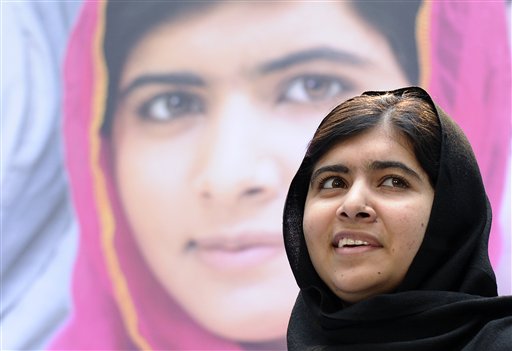
Few who saw Nobel prize winner Malala Yousafzai – the 17-year-old Pakistani girl who was nearly killed by the Taliban and who then went on to become an activist for female education – finger-wagging about the frivolousness of social media will have failed to notice how this former symbol of defiance has been co-opted by the nannying instincts of the middle-class Western establishment for which she has become a plaything.
Malala displays the sort of calculated asceticism you’d expect from a swotty scion of subcontinent privilege. Rather than celebrating her Nobel win, she watched TV with her parents – but not without telling the Sunday Times the trip from Birmingham to Norway made her fret about her school work. Am I alone in worrying about the poor girl’s social life, given how horribly dysfunctional her childhood is turning out to be?
She’s a strikingly eloquent teen, who looks and sounds much older than her years, lauded as the voice of her generation. To western liberals, she represents the archetypal poor brown girl saved from barbarians, the perfect symbol of oppressed exoticism. Even her name sounds like an ululation, though it gives plenty of people trouble: poor Naomi Campbell fell victim to autocorrect and called her “Malaria” in a recent congratulatory tweet. But, and I’m sorry to say this, she doesn’t half bang on.
Malala is perhaps the only 17-year-old in the world who doesn’t have a mobile phone. “I think it’s important that we use social media, but for a good purpose,” she recently told the New York Times. “For instance, it’s good to take a selfie to say hey what’s up and those things, but I think it’s also important that we use it for the good purpose of highlighting the issues that children all over the world are facing.” Well, excuse me for tweeting!
Malala, I’m sorry to say, is becoming a bit of a bore. Apologies if that sounds rude, but, in her defence, I don’t think it’s entirely Malala’s own fault. No one really believes that those press releases about drone strikes come from her own hand. And the idea that art and entertainment should be primarily used to spread “a message,” as her comments about mobile phones and Twitter suggest, is the sort of textbook cultural Marxism you would expect from a product of the United Nations, where her father, Ziauddin, is a Special Advisor on Global Education.
She began her public career under her father’s close supervision – blogging for BBC Urdu from a particularly conservative bit of Pakistan, and was then shot in the head by the Taliban. Miraculously, she survived, and her eloquence has impressed fawning western interviewers, not to mention the Nobel peace prize committee, that notorious cabal of professional trolls based in Oslo.
Of course, the Nobel Peace Prize, corporate social responsibility run amok with a dose of adorably bonkers Scandinavian utopianism thrown into the mix, has become something of a joke. You can’t blame Malala and her dad for accepting the award, but shouldn’t we be demanding they do something a bit more transformative with it than lecturing the West about the right way to use Twitter, and about female education, when everywhere in the West it is boys who need help?
Malala fights for education from a safe platform in the UK, where there are vanishingly few problems by global standards. Indeed, many of the girls she advocates for are steaming ahead of boys, particularly in British and American schools, with many educationalists now deeply concerned about the prospects of a generation of young men. Yet her words are co-opted by Western feminists as further evidence of the female exceptionalism to which we are all these days expected to pay obeisance.
Perhaps one of the reasons she doesn’t go home any more is that she has failed to win the hearts of Pakistanis, who recycle conspiracy theories about the attack on her and see her father as co-opted by the West and, for want of a better expression, part of the problem. At a minimum, Pakistani society is deeply divided about her, and it’s easy to understand why they might be sceptical.
There’s a whiff of hypocrisy, too, about the manner in which the apparatus of the Western political Left has appropriated Malala as a symbol of female empowerment. For one thing, she was targeted by a particularly oppressive Islamist organisation that we went to war against ten years ago. Yet the Left bitterly opposed that war.
It also feels strange to laud a teenager dressed in the garb of her oppressors. I’m sure it looks good at UNESCO conferences, but Malala’s hijab is a symbol of the misogynistic cultural attitudes whose most extreme form is the Taliban tendency which tried to end her life. So it feels a bit off that the same religious and cultural milieu that tried to kill her is used on stage in the West to play up her otherworldliness.
Anyway, ideological gripes aside, I hope little Malala ditches the schoolmarmishness soon, and discovers the sort of balls-out girl power for which Birmingham is so rightly celebrated. Because, as painful as it would be for the metropolitans who have adopted her as their trophy, the sight of this diminutive hijabed heroine tiptoeing on stage in six-inch Manolo Blahniks, skin-tight Gucci LBD and flowing, jet-black ‘do would be a more powerful screw-you to the Islamists than any number of interminable speeches at human rights conferences.

COMMENTS
Please let us know if you're having issues with commenting.